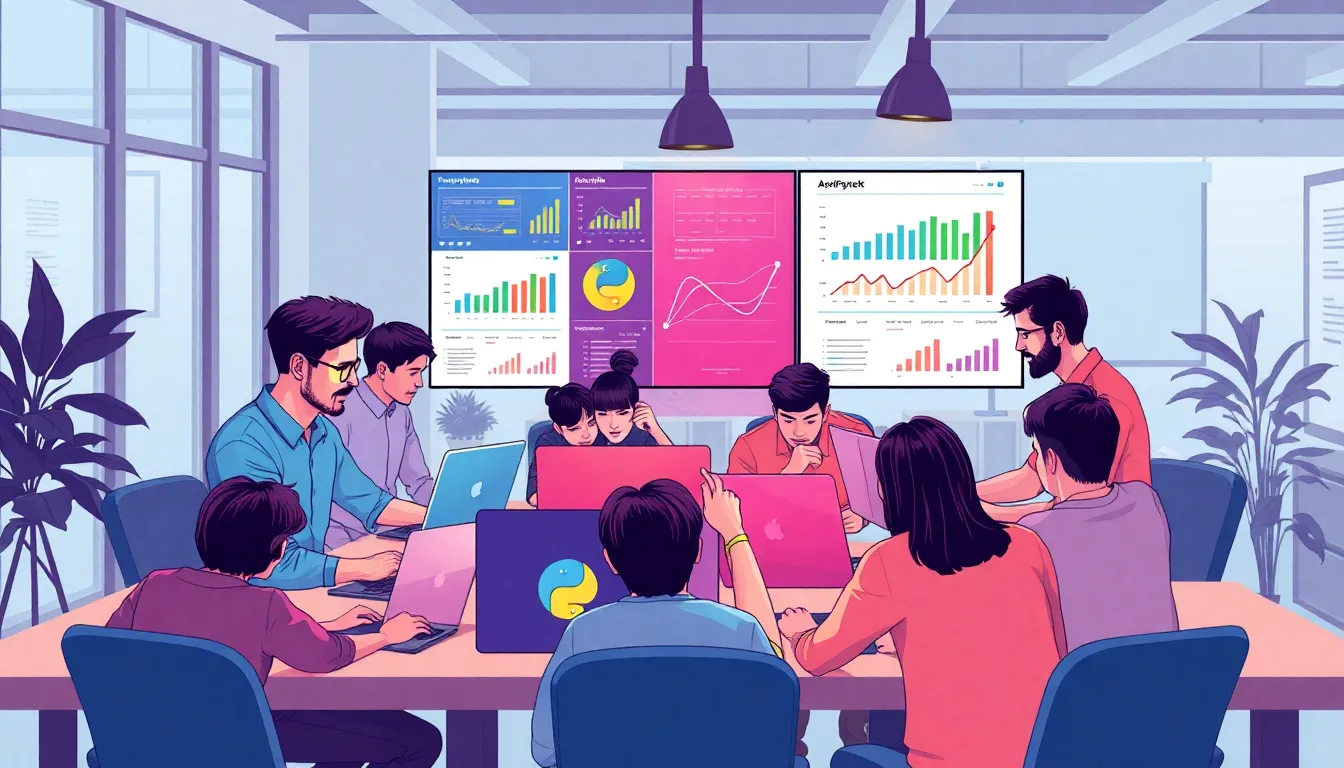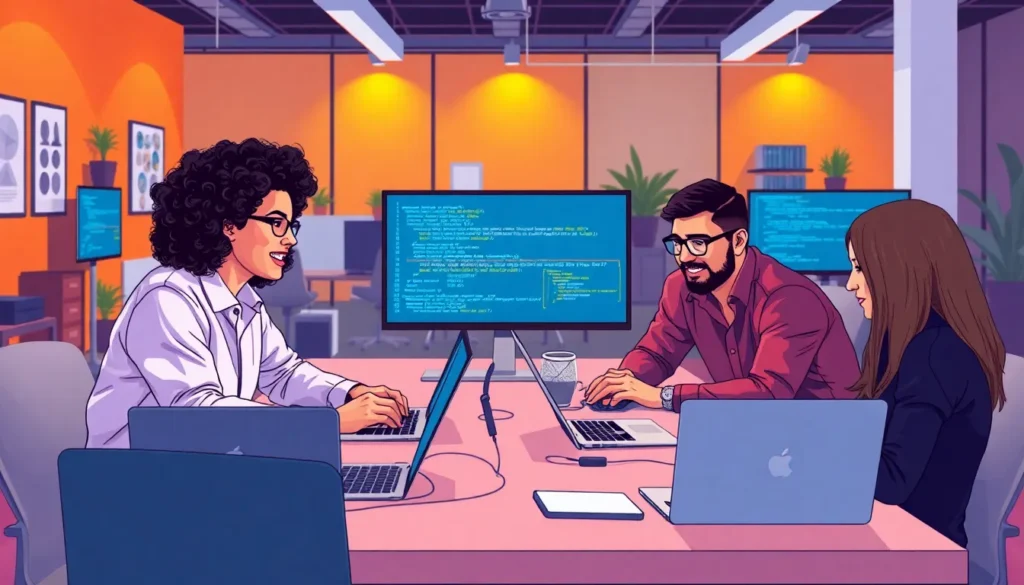Table of Contents
ToggleIn the fast-paced world of technology, programming trends can shift faster than a cat chasing a laser pointer. Staying updated isn’t just smart; it’s essential for developers who want to keep their skills sharp and their resumes appealing. From the rise of AI-driven development tools to the resurgence of functional programming, these trends are shaping the future of coding and making it more exciting than ever.
Overview of Latest Programming Trends
The programming landscape continues to shift, propelled by advancements in technology and changes in developer needs. AI-driven development tools gain traction, allowing developers to automate mundane tasks and focus on high-level problem-solving. Tools like GitHub Copilot provide real-time code suggestions, enhancing productivity and coding efficiency.
Functional programming experiences renewed interest as developers seek to write cleaner, more maintainable code. Languages like Scala and Elixir highlight this trend, emphasizing immutability and first-class functions. Adopting these languages improves performance in building concurrent applications.
Serverless architectures rise in popularity, enabling developers to deploy applications without managing server infrastructure. This model reduces costs and simplifies scalability challenges. Providers like AWS Lambda and Azure Functions make it easier to build and run applications in the cloud.
The shift toward low-code and no-code platforms accelerates, allowing non-developers to create applications with minimal coding expertise. These platforms streamline app development, giving businesses quicker access to market-ready solutions.
Additionally, the focus on DevOps practices remains strong, merging development and operations to enhance collaboration. Continuous integration and continuous deployment (CI/CD) pipelines improve software release cycles and overall application quality.
Lastly, security in programming gains attention, with developers prioritizing secure coding practices due to increasing cyber threats. Implementing tools for static code analysis helps identify vulnerabilities early in the development process.
These trends illustrate a dynamic programming environment, requiring developers to adapt and evolve their skill sets continually.
Popular Programming Languages in 2023

In 2023, the programming landscape showcases several leading languages that drive innovation and efficiency.
Trends in Python Development
Python continues to dominate data science and machine learning. Its simplicity and readability make it a favorite among developers. Popular libraries such as Pandas and TensorFlow enhance its capabilities, further fostering its use in AI applications. Additionally, community support keeps growing, as more developers share resources and tools. Companies increasingly rely on Python for automation and backend development due to its versatility and strong performance.
Growth of JavaScript Frameworks
JavaScript frameworks are experiencing robust growth this year. Frameworks like React, Angular, and Vue.js facilitate efficient web development. These frameworks enable developers to build dynamic user interfaces with ease. The focus on single-page applications drives their popularity. Framework updates also improve performance and incorporate modern features to suit developers’ needs. As web applications demand extensive interactivity, JavaScript frameworks remain essential for delivering seamless user experiences.
Emerging Technologies in Programming
Emerging technologies shape the programming landscape in significant ways. Key advancements drive innovation and efficiency in software development.
Artificial Intelligence and Machine Learning
Artificial intelligence continues to transform programming practices. Tools like GitHub Copilot automate routine coding tasks, allowing developers to engage in more complex problem-solving. Machine learning algorithms analyze vast datasets to assist in decision-making and code optimization. This shift enhances creativity while improving productivity. AI-driven platforms provide personalized learning experiences, adapting to individual developer needs and preferences.
Quantum Computing in Software Development
Quantum computing introduces new paradigms in software development. It enables solving complex problems that classical computers struggle with, particularly in fields like cryptography and optimization. Programmers must adapt their skills to harness quantum principles, using languages such as Q# and Qiskit. These languages facilitate the development of quantum algorithms and applications. Organizations investing in quantum technology gain a competitive edge, pushing the boundaries of computational capabilities.
Best Practices for Modern Development
Staying current with best practices enhances programming efficiency and effectiveness. Modern development strategies focus on flexibility and collaboration to streamline workflows.
Agile Methodologies
Agile methodologies prioritize adaptive planning and quick responses to change. Incorporating iterative processes enables teams to deliver work incrementally, allowing for early detection of issues. Teams often utilize Scrum or Kanban frameworks to enhance collaboration and accountability. Frequent feedback loops promote a culture of continuous improvement and innovation. Short sprints facilitate focused efforts on priority tasks, leading to better outcomes. These methodologies encourage cross-functional teams to work closely, fostering shared ownership of projects.
DevOps Integration
DevOps integration emphasizes collaboration between development and operations for improved software delivery. Teams leverage continuous integration and continuous deployment (CI/CD) practices to automate testing and deployment processes. This automation reduces time-to-market for applications, significantly enhancing efficiency. Collaboration tools support communication across teams, ensuring alignment on goals and priorities. Monitoring tools track application performance, allowing teams to identify issues proactively. Additionally, a strong emphasis on security practices, including regular code reviews, reduces vulnerabilities in production environments.
Staying ahead in programming means embracing change and adapting to emerging trends. As the industry evolves with AI tools and functional programming languages, developers must remain agile in their skill sets. The rise of serverless architectures and low-code platforms is reshaping how applications are built and deployed, making technology more accessible.
By prioritizing collaboration through DevOps and focusing on security, developers can enhance their impact in this fast-paced environment. The integration of agile methodologies supports continuous improvement and innovation. As new technologies like quantum computing emerge, the future of programming promises to be exciting and full of opportunities for those willing to learn and adapt.




